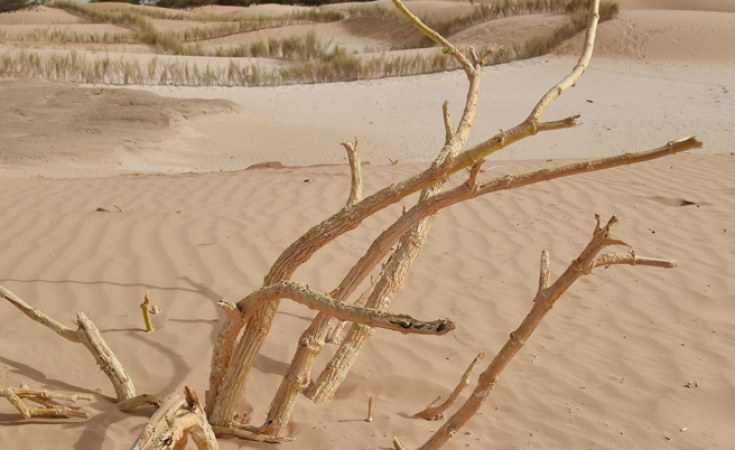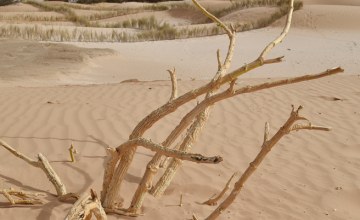The term 'glacial pace' - implying millennially slow movement - takes on real and literal meaning with climate change. The disappearance of our glaciers may in fact have hastened dramatically, but thus far it is our efforts to stop them doing so that have moved at a truly glacial pace.
This has to change, right now. Since the Kyoto Protocol came into being, we have failed miserably to protect our planet. Current trajectories show that the world is on track towards a temperature rise of around 3°C by 2100. Next week in Paris, 'COP21' is our last chance to turn the tide.
Nowhere matters more than Africa. We have long known that the continent which causes the least environmental harm suffers the most from the harm others cause. The World Meteorological Organisation recorded 1,300 climate-related natural disasters in Africa from 1970 to 2012, which took 700,000 lives and caused economic damage worth US $26 billion. In 2012 there were 99 of them - twice the long-term average.
Ten years ago, at COP11 in Montreal in 2005, Africa had no common position and no common negotiators. This year at COP21, it has a committee of African Heads of State on Climate Change; it has an expert team of about 200 climate negotiators; it has a clearly elaborated position on the negotiations, and a well-articulated collective work programme to support low-carbon and climate-resilient development on the continent.
So Africa means business on climate change. And it comes to Paris not just with hope, but with something to offer. At COP21 it brings three big 'Gives' to the rest of the world, and three big 'Asks'.
First, Africa gives its own commitment, and the cast-iron evidence that it will join the rest of the world in taking climate change seriously. 47 out of 54 countries in Africa had already completed their Intended Nationally Determined Contributions (INDCs) by the 1st October cut-off date. Each national plan states what each country can do, from tiny Comoros, committing to cutting emissions by 85% in 15 years, to Ethiopia announcing plans to cut its emissions growth in half in the same period. African countries have demonstrated greater ambition in cutting their emissions than the high-emitting countries.
Second, Africa makes the gift - to itself and to the world - of its enormous renewable energy resources. That potential is breathtaking: the continent can source a further 11 terawatts of solar energy, 350 gigawatts of hydropower, 110 gigawatts of wind power, and 15 gigawatts of geothermal potential. That power, if used to the full and responsibly managed, cannot just solve Africa's own energy problems, but those of other countries near and far, too.
Third, Africa gives to the world a share of the gigantic atmospheric vacuum cleaners that are its natural tropical forests. It has 650 million hectares of untouched forest, almost a fifth of the world's stock. These carbon 'sinks' can suck in 1.2 billion tonnes of carbon dioxide per year - about half the carbon dioxide emissions from all the homes in the US. And they can do this, even under the threat of deforestation and forest degradation. If we can preserve our forest, for instance in the Congo Basin, we can absorb more of our own and the world's carbon dioxide.
But Africa, of course, seeks support in kind from the world. It brings three 'Asks' to COP21, all of which are aimed at completing the circle of giving.
First, Africa asks for adequate finance - at least $11 billion per annum - to help it adapt to climate change. Only 4% of the world's total climate finance currently ends up in Africa, a situation that demands immediate reform. Africa, which is already short changed on climate change, must not be short-changed on climate finance. Communities that have contributed the least to climate change should not be the ones picking up the tab when Mother Earth fights back. As we write, southern and eastern Africa are suffering floods and droughts respectively, brought about by the worst El Niño - warm winds blowing off warm waters - in decades.
Second, Africa asks the world to join it in investing at least $55 billion per year in its energy sector up to 2030. Why? In the largest part, because this would bring full energy access to over 600 million Africans who do not have that today. Patchy energy means patchy business, patchy health, and patchy education. It means diminished life. The lack of energy has put the brakes on Africa's development. But why should the rest of the world buy into this, too? Because - by developing clean energy in Africa - we will collectively remove billions of tons of greenhouse gases from the air. And because - given the returns on renewable energy - we will collectively unlock millions of dollars in new business opportunities. Take the solar power project in Ouarzazate in Morocco. Not only has it generated 500 MW to provide for 1.1 million people: it has cut an annual 760,000 tonnes of carbon dioxide from the atmosphere, and its financial rate of return for its national and international investors is about 12%.
The third and last Ask is that the countries of the world reassess the demands they are making of each other. Limiting the global temperature rise to 2 degrees Celsius is not enough: we stand with the International Panel on Climate Change in wanting a revised target of 1.5 degrees.
The continent of proverbs reminds us that, "in moments of crisis, the wise build bridges". We are indeed in a crisis, and Africa is asking the rest of the world to join us in building bridges to a safer world. So let's be wise in Paris.
Akinwumi Adesina is the President of the African Development Bank and has recently committed to tripling the Bank's climate financing by 2020.
This article was first published in The Guardian.



